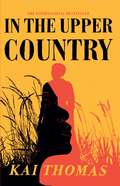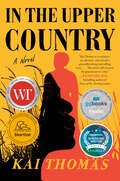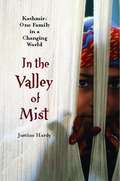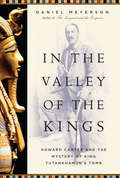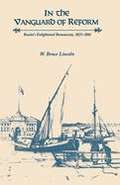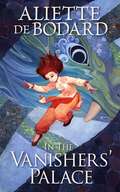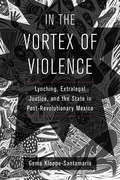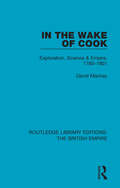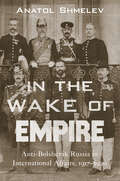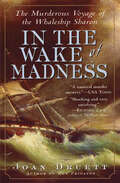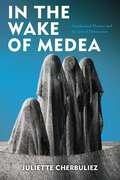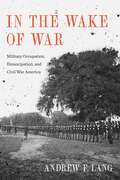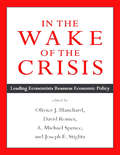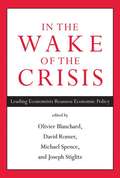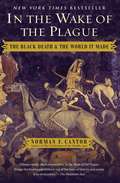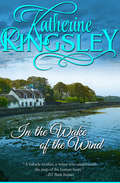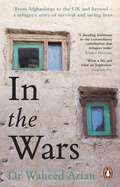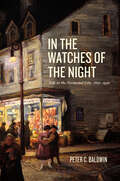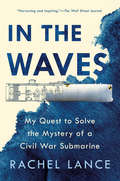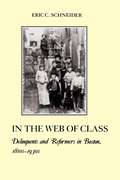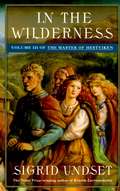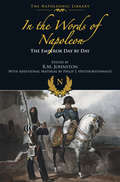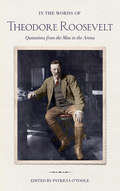- Table View
- List View
In the Upper Country
by Kai Thomas'Masterful . . . practically every page turns up a sentence or a phrase that could have been penned by Toni Morrison or James Baldwin' George Elliott Clarke, former Poet Laureate of Toronto Freedom, you can't get and bury, and keep it and keep it so it won't ever go away. No, child.You got to swing your freedom like a club.In 1859, deep in the forests of Canada, an elderly woman sits behind bars. She came to Dunmore via the Underground Railroad to escape enslavement, but an American bounty hunter tracked her down. Now she's in jail for killing him, and the fragile peace of Dunmore, a town settled by people fleeing the American south, hangs by a thread. Lensinda Martin, a smart young reporter, wants to gather the woman's testimony before she can be condemned, but the old woman has no time for confessions. Instead she proposes a barter: a story for a story. As the women swap stories - of family and first loves, of survival and freedom against all odds - Lensinda must face her past. And it seems the old woman may carry a secret that could shape Lensinda's destiny. Travelling along the path of the Underground Railroad from the American South to British Canada, from the Indigenous nations around the Great Lakes, to the Black refugee communities of Canada, In the Upper Country is an unforgettable debut about the interwoven history of peoples in North America, slavery and resistance, and two women reckoning with the stories they've been given, and the ones they want to tell.
In the Upper Country: A Novel
by Kai ThomasThe fates of two unforgettable women—one just beginning a journey of reckoning and self-discovery and the other completing her life's last vital act—intertwine in this sweeping, deeply researched debut set in the Black communities of Ontario that were the last stop on the Underground Railroad.Young Lensinda Martin is a protegee of a crusading Black journalist in mid-18th century southwestern Ontario, finding a home in a community founded by refugees from the slave-owning states of the American south—whose agents do not always stay on their side of the border. One night, a neighbouring farmer summons Lensinda after a slave hunter is shot dead on his land by an old woman recently arrived via the Underground Railroad. When the old woman, whose name is Cash, refuses to flee before the authorities arrive, the farmer urges Lensinda to gather testimony from her before Cash is condemned. But Cash doesn't want to confess. Instead she proposes a barter: a story for a story. And so begins an extraordinary exchange of tales that reveal the interwoven history of Canada and the United States; of Indigenous peoples from a wide swath of what is called North America and of the Black men and women brought here into slavery and their free descendents on both sides of the border. As Cash's time runs out, Lensinda realizes she knows far less than she believed not only about the complicated tapestry of her nation, but also of her own family history. And it seems that Cash may carry a secret that could shape Lensinda's destiny. Sweeping along the path of the Underground Railroad from the southern States to Canada, through the lands of Indigenous nations around the Great Lakes, to the Black communities of southern Ontario, In the Upper Country weaves together unlikely stories of love, survival, and familial upheaval that map the interconnected history of the peoples of North America in an entirely new and resonant way.
In the Valley of Mist
by Justine Hardy"If there is a paradise on earth, it is definitely here and only here," said the early seventeenthcentury Mughal Emperor Jehangir when describing the Kashmir Valley. This is a place that has always inspired poetry and war: the Kashmir Valley has been fought over for centuries. Tensions there exploded yet again in 1989, and since then it has been embedded in constant conflict -- every facet of militant and fundamentalist extremism having already exhibited its horrible results long before September 11, 2001.
In the Valley of the Kings
by Daniel MeyersonMeyerson presents an entirely new perspective on one of history's most fascinating subjects--not just what was inside King Tutankhamun's famous tomb, but the amazing journey of Howard Carter, the remarkable man who discovered it.
In the Vanguard of Reform: Russia's Enlightened Bureaucrats, 1825-1861
by W. Bruce LincolnThe first decade of Alexander II's reign is known in Russian history as the Era of the Great Reforms, a time recognized as the major period of social, economic, and institutional transformation between the reign of Peter the Great and the Revolution of 1905. Coming directly after the notoriously repressive last decade of the Nicholas era, the appearance of such dramatic reform has led scholars to seek its causes in dramatic events. Surely some great, even cataclysmic, force must have driven Alexander II and his advisers to initiate what appears to be such an astonishing change in policy. In their search for the origins of these Great Reforms, historians generally have focused upon two phenomena. <P><P>The first of these was Russia's defeat in the Crimean War by a relatively small, ineptly commanded Allied expeditionary force. The second was the serf revolts, which increased dramatically in the 1850s. From these events, most historians have concluded that the economic failings of serfdom, the problem of preserving domestic peace, and the need to restore Russia's tarnished military prestige were the major forces that convinced Alexander II's government to embark upon a new reformist path. <P><P>As Lincoln's examination of the long-unstudied Russian archival evidence shows, there are good reasons to question whether such crises of policy and failings of Russia's servile economy impelled Alexander II and his advisers along a previously uncharted reformist path after the Crimean War. Further, Lincoln argues that the Great Reform legislation simply was too complex and required sophisticated knowledge about the Empire's economic, administrative, and judicial affairs to have been formulated in the brief half-decade after the war's end.
In the Vanishers’ Palace
by Aliette De BodardFrom the award-winning author of the Dominion of the Fallen series comes a dark retelling of Beauty and the Beast.In a ruined, devastated world, where the earth is poisoned and beings of nightmares roam the land...A woman, betrayed, terrified, sold into indenture to pay her village's debts and struggling to survive in a spirit world.A dragon, among the last of her kind, cold and aloof but desperately trying to make a difference.When failed scholar Yên is sold to Vu Côn, one of the last dragons walking the earth, she expects to be tortured or killed for Vu Côn's amusement.But Vu Côn, it turns out, has a use for Yên: she needs a scholar to tutor her two unruly children. She takes Yên back to her home, a vast, vertiginous palace-prison where every door can lead to death. Vu Côn seems stern and unbending, but as the days pass Yên comes to see her kinder and caring side. She finds herself dangerously attracted to the dragon who is her master and jailer. In the end, Yên will have to decide where her own happiness lies—and whether it will survive the revelation of Vu Côn’s dark, unspeakable secrets...Advance praise for In the Vanishers’ Palace“Another stellar offering by Bodard. Her signature intensity is on display in this tale of people (and dragons) struggling to survive in the ruins of an alien conquest. Emotionally complex relationships interweave with richly drawn and deftly nuanced world-building.” —Kate Elliott, author of the Court of Fives series“A transformative experience. With dragons.” —Fran Wilde, Hugo and Nebula nominated author of The Bone Universe and The Gemworld series
In the Vortex of Violence: Lynching, Extralegal Justice, and the State in Post-Revolutionary Mexico (Violence in Latin American History #7)
by Gema Kloppe-SantamaríaIn the Vortex of Violence examines the uncharted history of lynching in post-revolutionary Mexico. Based on a collection of previously untapped sources, the book examines why lynching became a persistent practice during a period otherwise characterized by political stability and decreasing levels of violence. It explores how state formation processes, as well as religion, perceptions of crime, and mythical beliefs, contributed to shaping people’s understanding of lynching as a legitimate form of justice. Extending the history of lynching beyond the United States, this book offers key insights into the cultural, historical, and political reasons behind the violent phenomenon and its continued practice in Latin America today.
In the Wake
by Per Petterson Anne BornFiction about a middle-aged novelist who tries to cope with his grief after a boating accident claims the lives of his parents and 2 siblings.
In the Wake of Cook: Exploration, Science and Empire, 1780-1801 (Routledge Library Editions: The British Empire #3)
by David MackayOriginally published in 1985. After the epoch-making voyages of exploration of Captain Cook, a series of further exploratory missions was financed by the British government to add to the knowledge of the lands of the southern hemisphere: 'a more minute examination of the coast' was, for example, the brief of the voyage of the Investigator. Specimens of plants and fauna were to be collected, and useful products noted. The combination of the commercial streak with a commitment to empirical science was typical of the interests of the eighteenth century. This book traces the explorations and achievements of those who undertook missions of this kind, as extensions of their patrons' eyes, as it were. The commercial possibilities - of cotton, furs, foodstuffs, and other products - were exploited to the full, and the achievements of science thus helped to strengthen the imperial effort. Notable figures include the distinguished naturalist Sir Joseph Banks and the notorious Captain Bligh of the Bounty. The fascination and wide-ranging story is told with full scholarly documentation and many new insights and discoveries.
In the Wake of Empire: Anti-Bolshevik Russia in International Affairs, 1917–1920
by Anatol ShmelevEven as a country ceases to be a great power, the concept of it as a great power can continue to influence decision making and policy formulation. This book explores how such a process took place in Russia from 1917 through 1920, when the Bolshevik coup of November 1917 led to the creation of two regimes: the Bolshevik "Reds" and the anti-Bolshevik "Whites." As Reds consolidated their one-party dictatorship and nursed global ambitions, Whites struggled to achieve a different vision for the future of Russia. Anatol Shmelev illuminates the White campaign with fresh purpose and through information from the Hoover Institution Archives, exploring how diverse White factions overcame internal tensions to lobby for recognition on the world stage, only to fail—in part because of the West's desire to leave "the Russian question" to Russians alone. In the Wake of Empire examines the personalities, institutions, political culture, and geostrategic concerns that shaped the foreign policy of the anti-Bolshevik governments and attempts to define the White movement through them. Additionally, Shmelev provides a fascinating psychological study of the factors that ultimately doomed the White effort: an irrational and ill-placed faith in the desire of the Allies to help them, and wishful thinking with regard to their own prospects that obscured the reality around them.
In the Wake of Madness: The Murderous Voyage of the Whaleship Sharon (Playaway Adult Nonfiction Ser.)
by Joan DruettThe true story of one of history’s most notorious mutinies is revealed in this riveting “nautical murder mystery” (USA Today). In May 1841, the Massachusetts whaleship Sharon set out for the whaling ground of the northwestern Pacific. A year later, while most of the crew was out hunting, Capt. Howes Norris was brutally murdered. When the men in the whaleboats returned to the ship, they found four crew members on board, three of whom were covered in blood, the other screaming from atop the mast. Single-handedly, the third officer launched a surprise attack to recapture the Sharon, killing two of the attackers and subduing the other. An American investigation into the murder was never conducted—even when the Sharon returned home three years later, with only four of the original twenty-nine-man crew on board. Now, an award-winning maritime historian dramatically re-creates the mystery of the ill-fated whaleship—and reveals a voyage filled with savagery under the command of one of the most ruthless captains to sail the high seas. “When the American whaleship Sharon arrived at Sydney in December 1842, the world first heard of the shocking murder of the captain by several Pacific island natives serving on the crew. Chalking it up to the savage nature of the islanders, no one bothered to investigate. Druett, a widely published maritime historian, retells the familiar story of how the mutineers were overcome but delves deeper into the details of the infamous expedition . . . Druett’s account of the incident will appeal to those looking for a good drama, but also to those analytically minded skeptics inclined to ask questions and dig below the surface.” —Booklist “Shocking and very satisfying.” —Richard Zack, author of The Pirate Hunter
In the Wake of Medea: Neoclassical Theater and the Arts of Destruction
by Juliette CherbuliezIn the Wake of Medea examines the violence of seventeenth-century French political dramas. French tragedy has traditionally been taken to be a passionless, cerebral genre that refused all forms of violence. This book explores the rhetorical, literary, and performance strategies through which violence persists, contextualizing it in a longer literary and philosophical history from Ovid to Pasolini.The mythological figure of Medea, foreigner who massacres her brother, murders kings, burns down Corinth, and kills her own children, exemplifies the persistence of violence in literature and art. A refugee who is welcomed yet feared, who confirms the social while threatening its integrity, Medea offers an alternative to western philosophy’s ethical paradigm of Antigone. The Medean presence, Cherbuliez shows, offers a model of radically persistent and disruptive outsiderness, both for classical theater and for its wake in literary theory.In the Wake of Medea explores a range of artistic strategies integrating violence into drama, from rhetorical devices like ekphrasis to dramaturgical mechanisms like machinery, all of which involve temporal disruption. The full range of this Medean presence is explored in treatments of the character Medea and in works figuratively invoking a Medean presence, from the well-known tragedies of Racine and Corneille through a range of other neoclassical political theater, including spectacular machine plays, Neo-Stoic parables, didactic Christian theater. In the Wake of Medea recognizes the violence within these tragedies to explain why violence remains so integral to literature and arts today.
In the Wake of War: Military Occupation, Emancipation, and Civil War America (Conflicting Worlds: New Dimensions of the American Civil War)
by Andrew F. LangThe Civil War era marked the dawn of American wars of military occupation, inaugurating a tradition that persisted through the late nineteenth and early twentieth centuries and that continues to the present. In the Wake of War traces how volunteer and even professional soldiers found themselves tasked with the unprecedented project of wartime and peacetime military occupation, initiating a national debate about the changing nature of American military practice that continued into Reconstruction.In the Mexican-American War and the Civil War, citizen-soldiers confronted the complicated challenges of invading, occupying, and subduing hostile peoples and nations. Drawing on firsthand accounts from soldiers in United States occupation forces, Andrew F. Lang shows that many white volunteers equated their martial responsibilities with those of standing armies, which were viewed as corrupting institutions hostile to the republican military ethos. With the advent of emancipation came the enlistment of African American troops into Union armies, facilitating an extraordinary change in how provisional soldiers interpreted military occupation. Black soldiers, many of whom had been formerly enslaved, garrisoned regions defeated by Union armies and embraced occupation as a tool for destabilizing the South’s long-standing racial hierarchy. Ultimately, Lang argues, traditional fears about the army’s role in peacetime society, grounded in suspicions of standing military forces and heated by a growing ambivalence about racial equality, governed the trials of Reconstruction.Focusing on how U.S. soldiers—white and black, volunteer and regular—enacted and critiqued their unprecedented duties behind the lines during the Civil War era, In the Wake of War reveals the dynamic, often problematic conditions of military occupation.
In the Wake of the Crisis
by Joseph Stiglitz Michael Spence David Romer Olivier BlanchardIn 2011, the International Monetary Fund invited prominent economists and economic policy makers to consider the brave new world of the post-crisis global economy. The result is a book that captures the state of macroeconomic thinking at a transformational moment. The crisis and the weak recovery that has followed raise fundamental questions concerning macroeconomics and economic policy. For instance, to what extent are financial markets efficient and self-correcting? How crucial is low and stable inflation for growth and the real stability of the economy? How strong is the case for open capital markets? Too often, the standard models provided insufficient guidance on how to respond to the unprecedented situations created by the crisis. As a result, policy makers have been forced to improvise. What to do when interest rates reach the zero floor? How best to provide liquidity to segmented financial institutions and markets? How much to use fiscal policy starting from high levels of debt? These top economists discuss future directions for monetary policy, fiscal policy, financial regulation, capital account management, growth strategies, and the international monetary system, and the economic models that should underpin thinking about critical policy choices. Among the new realities they consider are the swing of the pendulum toward regulation; the need for new theoretical approaches, incorporating advances in agency theory, behavioral economics, and understanding of credit markets and finance based on theories of imperfect information; and the importance for macroeconomic policy to target not just inflation but also output and financial stability.
In the Wake of the Crisis: Leading Economists Reassess Economic Policy
by Joseph Stiglitz Michael Spence David Romer Olivier BlanchardIn 2011, the International Monetary Fund invited prominent economists and economic policy makers to consider the brave new world of the post-crisis global economy. The result is a book that captures the state of macroeconomic thinking at a transformational moment. The crisis and the weak recovery that has followed raise fundamental questions concerning macroeconomics and economic policy. For instance, to what extent are financial markets efficient and self-correcting? How crucial is low and stable inflation for growth and the real stability of the economy? How strong is the case for open capital markets? Too often, the standard models provided insufficient guidance on how to respond to the unprecedented situations created by the crisis. As a result, policy makers have been forced to improvise. What to do when interest rates reach the zero floor? How best to provide liquidity to segmented financial institutions and markets? How much to use fiscal policy starting from high levels of debt? These top economists discuss future directions for monetary policy, fiscal policy, financial regulation, capital account management, growth strategies, and the international monetary system, and the economic models that should underpin thinking about critical policy choices. Among the new realities they consider are the swing of the pendulum toward regulation; the need for new theoretical approaches, incorporating advances in agency theory, behavioral economics, and understanding of credit markets and finance based on theories of imperfect information; and the importance for macroeconomic policy to target not just inflation but also output and financial stability.
In the Wake of the Plague
by Norman CantorSocial history of the time just preceeding Europe's first outbreak of the Black Death in 1346. History of the short and long term effects of the epidemic particularly on Britain. There is an extensive bibliography with author comments on the books he includes. It can be read by those whithout extensive knowledge of the period or those with more background. A bit of random skittering from topic to topic and inclusion of some writing which has nothing to do with the period.
In the Wake of the Plague: The Black Death and the World It Made
by Norman F. CantorMuch of what we know about the greatest medical disaster ever, the Black Plague of the fourteenth century, is wrong. The details of the Plague etched in the minds of terrified schoolchildren -- the hideous black welts, the high fever, and the final, awful end by respiratory failure -- are more or less accurate. But what the Plague really was, and how it made history, remain shrouded in a haze of myths.Norman Cantor, the premier historian of the Middle Ages, draws together the most recent scientific discoveries and groundbreaking historical research to pierce the mist and tell the story of the Black Death afresh, as a gripping, intimate narrative.In the Wake of the Plague presents a microcosmic view of the Plague in England (and on the continent), telling the stories of the men and women of the fourteenth century, from peasant to priest, and from merchant to king. Cantor introduces a fascinating cast of characters. We meet, among others, fifteen-year-old Princess Joan of England, on her way to Spain to marry a Castilian prince; Thomas of Birmingham, abbot of Halesowen, responsible for his abbey as a CEO is for his business in a desperate time; and the once-prominent landowner John le Strange, who sees the Black Death tear away his family's lands and then its very name as it washes, unchecked, over Europe in wave after wave.Cantor argues that despite the devastation that made the Plague so terrifying, the disease that killed more than 40 percent of Europe's population had some beneficial results. The often literal demise of the old order meant that new, more scientific thinking increasingly prevailed where church dogma had once reigned supreme. In effect, the Black Death heralded an intellectual revolution. There was also an explosion of art: tapestries became popular as window protection against the supposedly airborne virus, and a great number of painters responded to the Plague. Finally, the Black Death marked an economic sea change: the onset of what Cantor refers to as turbocapitalism; the peasants who survived the Plague thrived, creating Europe's first class of independent farmers.Here are those stories and others, in a tale of triumph coming out of the darkest horror, wrapped up in a scientific mystery that persists, in part, to this day. Cantor's portrait of the Black Death's world is pro-vocative and captivating. Not since Barbara Tuchman's A Distant Mirror have medieval men and women been brought so vividly to life. The greatest popularizer of the Middle Ages has written the period's most fascinating narrative.
In the Wake of the Wind
by Katherine KingsleyThe national bestselling author delivers a Regency romance with &“a memorable heroine, steamy lovemaking and delightful scenes involving white magic&” (Publishers Weekly). During her years of exile in Wales, Serafina&’s only solace has been the golden-haired lover who has haunted her dreams. She even convinced herself that he must be the man she is set to marry the next day. But during a moonlight walk in the woods she comes across a dark stranger who shatters her hopes with a kiss and a devastating revelation of the feelings of her betrothed. Preparing to marry a woman he doesn&’t know, Aiden Delaware, Earl of Aubrey, seeks solace in the woods, stumbling upon a maiden as beautiful as a fairy queen. He tells her his darkest secret: He already despises his betrothed and has no wish to be forced into an arranged marriage. The next day, Aiden learns the shocking truth: The beauty from the woods he&’d loved at first sight turns out to be the unwanted fiancée, who now knows his true feelings. Despite this inauspicious beginning, Aiden and Serafina gradually discover that marriage is more than a contract, and love can span more than a lifetime. &“Kingsley has done an excellent job of bringing us two wonderful lovers and a cast of secondary characters you can sink your teeth into.&” —Rendezvous &“Another dreamspun romance . . . Once more Katherine Kingsley works her magic . . . in a story that lifts your heart and makes your soul sing.&” —Romantic Times
In the Wars: An uplifting, life-enhancing autobiography, a poignant story of the power of resilience
by Dr Waheed ArianAS HEARD ON DESERT ISLAND DISCSAS SEEN ON THE CHANGEMAKERS, a Paramount+ docuseries profiling activists fighting for changeA WATERSTONES PAPERBACK OF THE YEAR'A riveting story of loss, exile, and rebirth.' KHALED HOSSEINI, author of The Kite Runner'One of the most incredible life stories you will ever hear.' JAMES O'BRIEN'A remarkable story. I thought this book was brilliant.' NAGA MUNCHETTY__________Born in war-torn Afghanistan, Waheed Arian's first memories are of bombs. His first-hand experience of the power of medicine inspired him to dedicate his life to healing others. But how does a boy with nothing hope to become a doctor?Fleeing the conflict with his family, he spent much of his childhood in refugee camps in Pakistan, living sometimes ten to a room without basic sanitation or access to education. Waheed largely taught himself, from textbooks bought from street-sellers, and learned English from the BBC World Service.Smuggled to the UK at fifteen with just a hundred dollars in his pocket, he found a job in a shop. He was advised to set his sights on becoming a taxi driver. But the boy from Kabul had bigger ambitions.Working through PTSD and anxiety, he studied all hours to achieve his vocation. He was accepted to read medicine at Cambridge University, Imperial College and Harvard, and went on to become a doctor in the NHS, currently in A&E.But he wanted to do more. In 2015 he founded Arian Teleheal, a pioneering global charity that connects doctors in war zones and low-resource countries with their counterparts in the US, UK, Europe and Australia. Together, learning from each other, they save and change lives - the lives of millions of people just like Waheed.For readers of Educated and War Doctor, this is the extraordinary memoir of a boy who recognized the power of education and dreamed about helping others. It is a tale of courage, ambition and unwavering resilience in the face of all the challenges that life can throw in your way.__________WINNER OF:UNESCO's Global Hero AwardWho Cares Wins Best Doctor AwardThe Times's Man of the Year Award
In the Watches of the Night: Life in the Nocturnal City, 1820–1930 (Historical Studies of Urban America)
by Peter C. BaldwinBefore skyscrapers and streetlights glowed at all hours, American cities fell into inky blackness with each setting of the sun. But over the course of the nineteenth and early twentieth century, new technologies began to light up streets, sidewalks, buildings, and public spaces. Peter C. Baldwin’s evocative book depicts the changing experience of the urban night over this period, visiting a host of actors—scavengers, newsboys, and mashers alike—in the nocturnal city.Baldwin examines work, crime, transportation, and leisure as he moves through the gaslight era, exploring the spread of modern police forces and the emergence of late-night entertainment, to the era of electricity, when social campaigns sought to remove women and children from public areas at night. While many people celebrated the transition from darkness to light as the arrival of twenty-four hours of daytime, Baldwin shows that certain social patterns remained, including the danger of street crime and the skewed gender profile of night work. Sweeping us from concert halls and brothels to streetcars and industrial forges, In the Watches of the Night is an illuminating study of a vital era in American urban history.
In the Waves: My Quest to Solve the Mystery of a Civil War Submarine
by Rachel LanceOne of "The Most Fascinating Books WIRED Read in 2020""One part science book, one part historical narrative, one part memoir . . . harrowing and inspiring.&”—The Wall Street Journal How a determined scientist cracked the case of the first successful—and disastrous—submarine attack On the night of February 17, 1864, the tiny Confederate submarine HL Hunley made its way toward the USS Housatonic just outside Charleston harbor. Within a matter of hours, the Union ship&’s stern was blown open in a spray of wood planks. The explosion sank the ship, killing many of its crew. And the submarine, the first ever to be successful in combat, disappeared without a trace. For 131 years the eight-man crew of the HL Hunley lay in their watery graves, undiscovered. When finally raised, the narrow metal vessel revealed a puzzling sight. There was no indication the blast had breached the hull, and all eight men were still seated at their stations—frozen in time after more than a century. Why did it sink? Why did the men die? Archaeologists and conservationists have been studying the boat and the remains for years, and now one woman has the answers. In the Waves is much more than just a military perspective or a technical account. It&’s also the story of Rachel Lance&’s single-minded obsession spanning three years, the story of the extreme highs and lows in her quest to find all the puzzle pieces of the Hunley. Balancing a gripping historical tale and original research with a personal story of professional and private obstacles, In the Waves is an enthralling look at a unique part of the Civil War and the lengths one scientist will go to uncover its secrets.
In the Web of Class: Delinquents and Reformers in Boston, 1810s-1930s (The American Social Experience #10)
by Eric C. Schneider"An analytic overview of the history of social welfare and juvenile justice in Boston..[Schneider] traces cogently the origins, development, and ultimate failure of Protestant and Catholic reformers' efforts to ameliorate working-class poverty and juvenile delinquency."-Choice"Anyone who wants to understand why America's approach to juvenile justice doesn't work should read In the Web of Class."-Michael B. Katz,University of Pennsylvania
In the Wilderness: The Master of Hestviken, Vol. 3 (Master of Hestviken #3)
by Sigrid UndsetIt is Norway in the thirteenth century, a land rent by unremitting warfare and feebly lit by Christianity. Olav Audunsson was once an outlaw; now he is a man of wealth and stature. But he is haunted by the memory of crimes for which there is no easy atonement and by losses that may never be redeemed.
In the Words of Napoleon: The Emperor Day by Day (The Napoleonic Library)
by Philip HaythornethwaiteA powerful portrait of a complex individual. It uses Napoleons own words to show his genius, arrogance, insecurities, and frustrations. The reader will be amazed by Napoleons attention to detail, from those of pressing national interests to the mundane (such as the problem of heartbroken soldiers in his guard.) . . . This makes it an invaluable reference book that should be on the bookshelf of anyone interested in the period. Rob Burnham, Editor, Napoleon SeriesIn the words of Napoleon is a startling insight into the life and deeds of Napoleon I. Derived from Napoleons extensive correspondence and his other writings and recorded speech, this valuable compilation acts as a diary or journal, encompassing the whole of the emperors life. Napoleons words as recorded on a particular day are set down as entries, and these offer a unique glimpse into the major events of the Napoleonic period.The diary reveals Napoleons thoughts and actions as his great life unfolded and throws light on his attitudes to war, politics and the many varied personalities who surrounded or opposed him. As entries appear on an almost daily basis, the reader has the opportunity to trace the surging course of events as they happened, and to witness the emperors response to the rise and fall of his fortunes.Philip Haythornthwaite provides a fascinating introduction which analyses Napoleons words, and includes biographical sketches of the key personalities of the era.
In the Words of Theodore Roosevelt: Quotations from the Man in the Arena
by Theodore Roosevelt Patricia O'TooleThe public life of Theodore Roosevelt (1858-1919) was marked by his service as the twenty-sixth President of the United States, Vice President, Governor of New York State, Assistant Secretary of the Navy, U.S. Civil Service Commissioner, President of the New York City Police Commission, and New York State Assemblyman. In his life outside of government he was famous as an author, naturalist, rancher, big game hunter, and explorer. The twentieth century would become known as the American Century, and it was Theodore Roosevelt, through his foreign policy, who ushered the United States into the ranks of the world's great powers. In domestic affairs, he used his presidential powers to level the playing field between capital and labor, to protect consumers, and to establish a conservation program that was far-sighted and comprehensive, covering the nation's natural resources, its wilderness areas, its endangered species, its scenic beauty, and the cultural artifacts of its indigenous peoples.Distilled from Roosevelt's voluminous writings and speeches, In the Words of Theodore Roosevelt is a discerning collection of quotations by this American icon who continues to inspire and captivate an extraordinary array of twenty-first-century Americans. Carefully selected and organized by topic by Patricia O'Toole, these quotations reflect the vast range of Roosevelt's interests, the depth of his wisdom, his almost superhuman energy, and his directness. Many of the issues that Roosevelt addressed-from America's international role to the environment-remain pressing concerns today, giving his century-old words remarkable currency. This singular collection of quotations-enhanced by O'Toole's illuminating introductory essay, notes on biographical and historical context, and bibliographies of Roosevelt's writings-is a trove for writers, teachers, students, and all who recognize Theodore Roosevelt's unique role in U.S. history.
